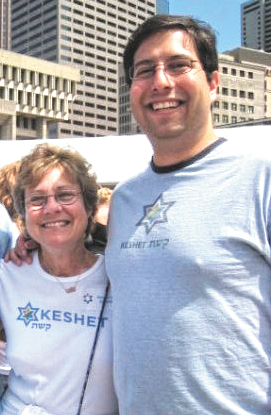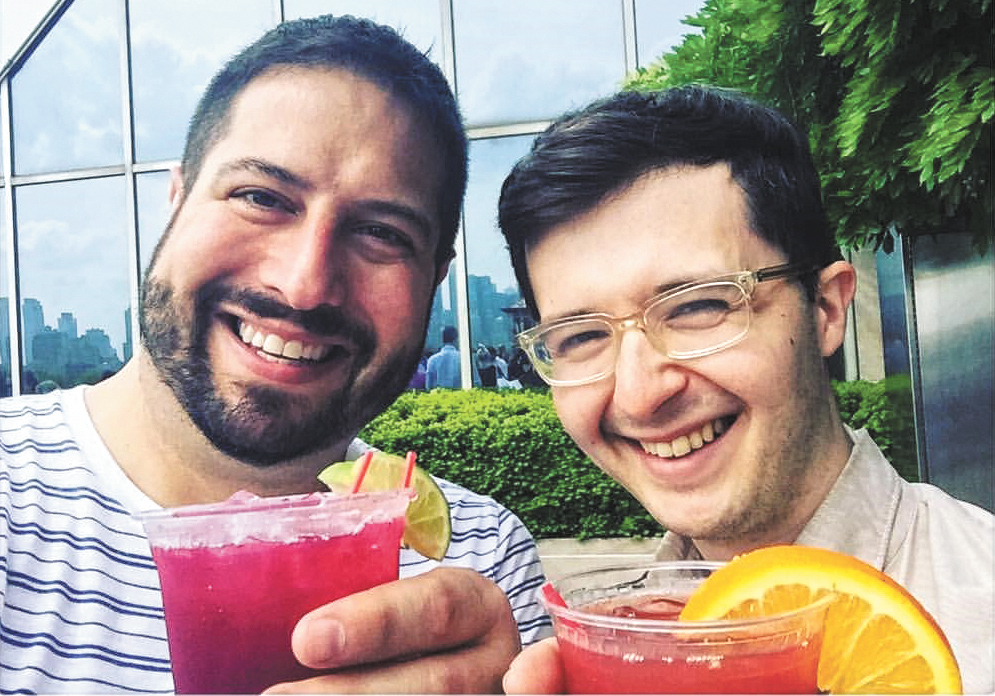Wedding planning without mom

By David Levy
InterfaithFamily.com
Weddings are supposed to be days full of joy overflowing. Sure, we know that any big event involving multiple families (and multiple contractors) is going to carry with it a base level of stress, but we’ve been prepared (by pop culture, guidebooks, and the wisdom of friends who’ve been there) to deal with minor setbacks and roll with the punches. What none of that prepared me for, though, was the prospect of getting married without my mother.
My mom and I were as close as a mother and son can get. While others may drift apart during the awkward or combative teenage years, we spent most weekends together because she was (with my blessing) the youth director for my synagogue. I was happy to share my formative USY experiences with her, and I loved that she knew so many of my friends — who also called her mom. As I got older, although we may have seen each other less consistently, she remained a constant presence in my life and relished any chance she had to spend time with the friends who made up my communities.
The one person in my life she never got to know is the man who will soon be my husband. My mother died two years before we met each other; in some ways, meeting Keith was the event that enabled me to end the extended period of grief I felt and start looking ahead to a future of possibilities.
I’m sure my mother never pictured that I would be planning an interfaith wedding, despite the fact that every married person of my generation on both sides of my extended family is married to someone of another (or no) religion. But I’ve continued to grow and change since she’s been gone, which is what I know she would want for me. She would understand that even someone like me — who spent 15 years working in the Jewish community and earned advanced degrees from Hebrew College — can fall in love with someone for whom religion just isn’t a meaningful part of his life. Ultimately, I know that my mother would love Keith as much as she loved all of the other wonderful people who have married into our family.
When Keith and I first started to talk about getting married, I knew that it was important to me to have a big enough reception to accommodate as much of my large, extended family as I could. This is a value I inherited from my mother, who embraced every opportunity to get the whole group together, especially for simchas, happy occasions.

As we’ve begun to put together our plans, I find myself taking pride in our decisions that I think she would have appreciated. While I wouldn’t say we are trying to plan a ceremony and reception that would be to her particular tastes, I do feel we are honoring her spirit as we focus on making choices that emphasize joy and togetherness over extravagance.
One of the most heated arguments I had with my mother around my Bar Mitzvah centered on my disappointment that she wouldn’t shell out for a balloon arch, insisting that flowers were decoration enough. On the one hand, here I am nearly 30 years later still thinking about the balloon arch that never was; on the other hand, she was right — the night was beautiful and the absence of balloons didn’t make a damn bit of difference. That is the spirit I’m trying to channel.
But planning is hard without her! And it’s not just emotionally hard. She is the person I would most want opinions from when it comes to ordering invitations and choosing linens. And as Keith and I put together our interfaith ceremony, my mother is the person I most wish I could bounce ideas off of, and get her take on which Jewish rituals feel most meaningful or what other innovations might feel too “out there.” Although I’m sure we would butt heads over certain choices, I would give anything to have her aggravating me with accusations that I’m behind schedule on mailing save-the-dates or second-guessing my decisions about venue and catering.
All that is hard, but it pales in comparison to the grief that surfaces whenever I start to imagine the specifics of the day. I face a wall of pain thinking about marking this moment in my life without her. In some ways, planning a gay wedding makes it even harder, because there will be another mother-son relationship staring me in the face.
While I would never want to deny my husband the opportunity to have a mother-son dance, for example, I can’t imagine how hard it will be for me to watch them knowing I can’t have a similar moment.
I started to think about how I wanted to make space in our wedding ceremony to remember my mother. This feels so huge to me, representing a void so utterly unfillable, it took me months to be calm enough when approaching the question to even begin considering options. On the one hand, I worry that any moment set aside to remember her will be so sharp, so sad, so painful that it will mar my experience of the day in such a profound way, I may not recover. But the only thing that feels worse than facing that grief on my day of happiness would be to let it pass by unmarked.
I’ve been to plenty of weddings where those who were no longer living were acknowledged by name, but it just doesn’t seem right to include my mother alongside the names of aunts and uncles and grandparents we miss, for although we feel those losses sincerely, none are as acute. So I asked around, including in InterfaithFamily’s Planning Your Jewish Interfaith Wedding Facebook group, to see how others had acknowledged their missing parents. Some shared stories of creating their chupah (wedding canopy) from a parent’s tallis (prayer shawl) or favorite tablecloth.
Others incorporated an inherited necktie or jewelry into their wedding-day attire or made new items from the fabric of a mother’s dress or veil. Some lit candles by framed photographs, and at least one person visited the cemetery the day after the wedding to leave flowers from the bridal bouquet.
I hoped that in asking around, I’d stumble on an “aha!” answer for myself that felt right. And perhaps I will.
But in these conversations, I’ve been reminded there is something distinctly Jewish about tempering even our happiest moments with an acknowledgement of loss.
Some say this is what the ceremonial breaking of the glass at the end of the wedding ceremony represents. I suspect that whatever we decide will be somehow tied into that ritual.
David Levy lives in Brooklyn with his fiancé, Keith. Their wedding is scheduled for May 2020.
To read the complete February 2020 Dayton Jewish Observer, click here.


